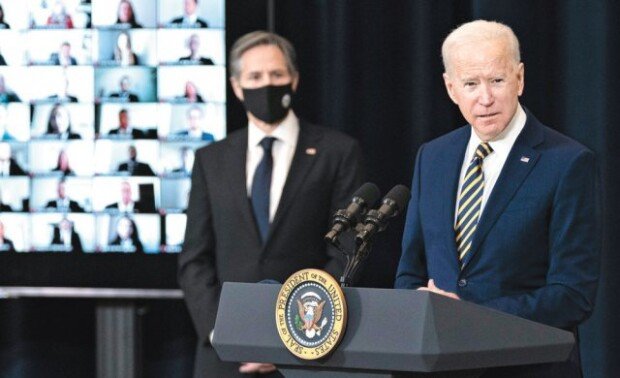First ROK-US defense cost sharing talks held since Joe Biden took office
First ROK-US defense cost sharing talks held since Joe Biden took office
Posted February. 06, 2021 07:29,
Updated February. 06, 2021 07:29

The negotiations between South Korea and the U.S. for the Special Measures Agreement (SMA) are proceeding fast since the Joe Biden administration took office. The defense cost-sharing talks have been stalled for some time due to former U.S. President Donald Trump’s excessive demands for cost sharing but the new U.S. administration and South Korea have agreed to reach a defense cost-sharing deal at the earliest possible date. In addition, U.S. President Biden’s recent announcement that he will freeze plans to withdraw American troops from Germany is expected to quell speculation that the U.S. may trim troops from South Korea.
South Korean Foreign Ministry said on Friday that the two allies had their eighth round of talks for the 11th Special Measures Agreement (SMA) via videoconference. It is the first official meeting between the two countries since U.S. President Joe Biden took office. The meeting was attended by South Korea’s chief negotiator in defense cost-sharing deal Jeong Eun-bo, U.S. envoy for defense cost-sharing deal Donna Welton, and officials from the U.S. Forces Korea (USFK) and department of defense of both countries. The Foreign Ministry said the two sides had sincere discussions to narrow the differences and reach a mutually acceptable agreement. The Ministry added that the two allies agreed to work together to contribute to strengthening the ROK-U.S. alliance and the combined defense posture as a linchpin of peace and prosperity on the Korean Peninsula and in Northeast Asia by concluding the defense cost-sharing negotiations at the earliest date possible.
In March 2020, South Korea and the U.S. tentatively agreed to a 13% increase in defense cost-sharing from the previous deal of 1.039 trillion won. But former U.S. President Donald Trump rejected the tentative agreement and continued to push South Korea to pay more by calling it a wealthy country. Since then, the two sides have failed to find a breakthrough in negotiations with the U.S. asking for a 50% increase in South Korea’s contributions.
The fact that the stalled negotiations between South Korea and the U.S. resumed about 15 days after U.S. President Biden took office is a sign that the White House has a willingness to promptly address issues that stand in the way of strengthening ROK-U.S. alliance.
It is known that the two countries are likely to agree to an increase of 13%, the level tentatively agreed last year, after the eighth round of talks. “We’re making progress in many areas with negotiations being held on the basis of what the two sides had agreed to last year before former President Trump made the rejection. I believe the two sides will reach a reasonable agreement,” said a government official.
With negotiations for SMA proceeding fast after the Biden administration took over, Washington’s USFK policy will likely change as well. Speaking at the State Department on Wednesday (local time), President Biden said he will freeze Trump’s plan to withdraw U.S. troops from Germany until Defense Secretary Lloyd Austin does a review of American troops’ presence around the globe. In July last year, former President Trump approved plan to withdraw or reposition one-third of U.S. troops from Germany in response to Germany’s refusal to spend a greater share of its gross domestic product on defense. There are speculations that unlike Trump, who used the withdrawal of U.S. troops in South Korea as a pressure card to increase South Korea’s contributions, President Biden will not use a pullout of the USFK as a tactical tool.
Ji-Sun Choi aurinko@donga.com





![[천광암 칼럼]장동혁은 대체 왜 이럴까](https://dimg.donga.com/c/138/175/90/1/wps/NEWS/IMAGE/2026/02/22/133399127.1.jpg)

